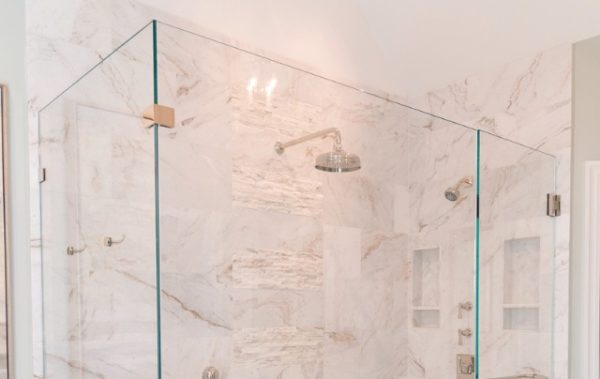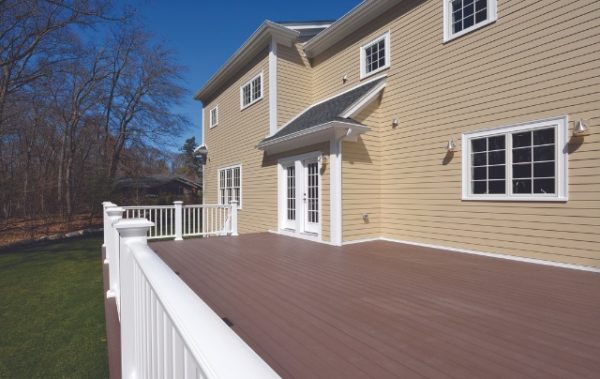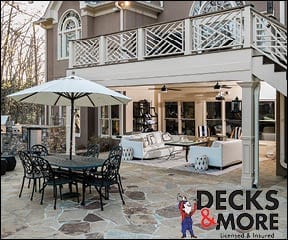Renovate or Relocate?

|
BEFORE |
|
AFTER |
When Buzz and Dawn Anderson started their life together in their Brookhaven home, lack of space was not a concern. Fifteen years and four children later, they knew it was time to make a decision: to move or not to move.
The couple looked at houses for more than a year, weighing the cost of buying against what they would pay to expand and renovate. And there were other factors to consider, as well. We love the neighborhoodits such a community. You just drive through and you know everybody. Thats hard to find in the citya true neighborhood, Dawn Anderson says. The close-knit feel of the community, along with their love for their childrens school and the country club where they are members, played into their decision to remodel.
The additions, designed by architect Linda MacArthur and executed by The DeLany Company, nearly doubled the square footage of the house to 7,000. Among them were a family room, an added screened-in porch, a study, a bedroom, a laundry room, a bathroom (two existing bathrooms were redone), walk-in closets, a two-car garage and a mudroom/office.
 |
During the eight-month project last year, the Andersons lived out of their basement, coming upstairs only to take showers. It was like campingwe really roughed it, Dawn Anderson says. She says the chaotic state of the house made it hard to hold onto the idea of what the house eventually would become. It was hard to envision because it was a shipwreck, she recalls. Renovation is not for everybody.
But for all the inconvenience and chaos that took over their lives for the duration of the project, the Andersons are thrilled with the result. They have the space and updates they needed, and, as as added bonus, the value of their home has increased by about 80 percent.
Coming up with an answer to the question of whether to renovate or relocate is not as simple as it may seem. There are many factors that must be considered when deciding whether to plan or pack.
Consider every aspect
The first step in choosing between renovation and relocation should be examining your existing home and neighborhood. Are you in a defined neighborhood? asks Chuck Brownlow, president of Brownlow & Sons Company Inc. in Marietta. Are the houses very similar, with cookie-cutter designs? Are there restrictions by the developer or builder regarding structure design? Or are you in an older neighborhood, such as Kirkwood, Inman Park or Morningside, defined by its location, rather than the developer or builder? Since renovating the home will affect the homes resale value, the type of area you currently live in could affect your decision. The question is, how much? A kitchen is a low-risk renovation because it adds to the resale value, says Jonathan Tongyai, president of Southern Styles Remodeling Inc. in Kennesaw. However, a basement buildout may take longer to sell.
Another factor is the resale value of surrounding homes. If your remodel increases your homes value far beyond those in your neighborhood, you may have trouble selling it for the first few years after the project is completed. Market conditions matter greatly as to what your return will be, says Tim Heaney, division manager of John Wieland Remodeling in Smyrna.
BEFORE |
However, if you plan to stay for many yearsat least fiveyou have a good chance of surrounding property values rising up to meet your homes value. If you spend the money, and itll make you happy for the next five to 10 years, then remodel, says Charlie Hipple, president of Cardinal Construction in Duluth. If its a $300,000 home and the remodel costs $180,000, it might be better to move, because your house may be overpriced for the neighborhood.
AFTER |
The second step in making your decision is evaluating your community. Do you like your neighbors? Are the schools good? Is it convenient to the areas you frequent: work, shopping, friends, etc.? This was a key factor in Carole Criders decision to renovate her house in Doraville. We love our community and really wouldnt consider moving, she says. Our neighborhood contains the most green space of any area north of Piedmont Park, inside the Perimeter. Were fortunate to live within 1 mile of a MARTA train station, a couple blocks from some of the best ethnic dining in Atlanta and we can walk to the grocery store, church, etc. The police department here is top-notch. And good neighbors are hard to find! Were blessed with many.
The third step should be considering the houses age. For older homes, renovation could prove quite costly. For example, if the structure has some deterioration or the plumbing needs to be brought up to new building codes, it may be better to cut your losses and sell. On the other hand, selling the home may prove difficult with such problems.
|
QUESTIONS TO ASK YOURSELF What space needs does my family have that the current house is not meeting? Could this space be added or converted from existing space? How old is the current house? What updates are needed? How much would it cost to move into another house that meets our needs? Could we afford to buy a house with the features we are looking for in a desirable location? Where do we want to live? Is the current neighborhood our ideal neighborhood? Is our current house in a convenient location in relation to friends, shopping, work, etc.? Would the children have to change schools if we moved? Would the change be a good one? What clubs and activities does my family enjoy? Will those change if we move? How much would it cost to make the additions and changes necessary to make the current house the house we want? How would a renovation affect the value of our home? Where would we live during the renovation process? Could we afford to live somewhere else temporarily or would we live in the house while the work is being done? How would the renovation/moving affect our daily lives? How long do we plan to live in the current house if it is remodeled? How long would we plan to live in another house if we moved? How long would we expect renovations to take? Is this a realistic expectation? Do we know of a contractor we could trust to do the work? Do we know how to find one? Do we know of others who have had similar work done who could offer a referral? Would I hire a general contractor to oversee everything or would I do that myself? |
Finally, evaluate the features of your current home that you would want in a new home. Lot size, unique exterior design, amount of treesall the little things that make your house your home. Find out if you can find comparable features elsewhere.
When Michael and Jamie Balk weighed the pros and cons of renovating their 1950s contemporary ranch home in Buckhead, they found that, for their family, moving made more sense. The plans they had drawn up called for about $1 million in renovationsa complete overhaul. Half the builders we talked to said, You just need to tear this house down, Michael Balk says. On top of that, the isolated location and the community did not fit the Balks vision, so they decided to move to a house in Morningside. They then decided to renovate that house to turn it into the house they wanted. Balk cautions against renovating a house that is not in a location you consider ideal. Dont commit the time and resources if its not what you want, he says.
A challenging experience
Next, you should examine the challenges of renovation, as well as those of relocation. These also will aid you in making a decision with which you can live. Many people are familiar with the challenges of relocation: trying to sell a home, trying to buy a home, packing, hiring movers, unpacking and helping children adjust. And dont overlook the financial aspects. Consider the built-in cost of selling and buying another house, Heaney says. Closing costs, real estate commissions, appraisals and attorneys fees all add up to a hefty sum; and, because youre buying and selling, it will be for two real estate transactions. Is this amount greater than the cost of renovation? If so, renovation may be the better choice.
Of course, finances also present a challenge for renovation. How much money do you want to spend? How will you pay for it? Heaney asks. Just as with purchasing a new home, you must have a set budget for renovations. This will determine what projects you can have done as well as what options you have in choosing paint, wallcoverings, floorings, trim and appliances for your project. Always try to think of every possible expense, Hipple says. However, do be prepared for unforeseen expenses to crop up.
Having a clear idea of what your project will entail also can aid the contractor in staying on schedule. If you have to make a lot of decisions during the process or you decide to make a lot of changes along the way, expect the project to take longer to complete. If you change during the project, its going to slow the project down, says Richard Feis, owner of Square Foot Design Build in Atlanta.
Another challenge is finding the right contractor. A lot of folks gravitate to the lowest price, which sometimes isnt the best value, Tongyai says. While price is very important, you also should look for a contractor with whom you feel comfortable. Open communication between contractor and homeowner is vital to a renovation. In fact, poor communication led to several setbacks for Crider. [The contractors would] say they were going to show up to work on a particular day, and theyd never show, she says.
To find a good contractor, first check with the National Association of the Remodeling Industry (www.nari.org). NARI members are encouraged to follow the associations ethics guidelines. Also, look at how long the contractor has been in business. If its less than five years, its hard to tell [what the contractors reputation is], Heaney says. The Better Business Bureau is another good source. The best source, however, usually is family and friends, so be sure to ask around for referrals.
Of course, there is another key challenge. Living through it is the biggest challenge, Feis says. Noise, dust and people in and out of your house are just a few of the inconveniences of a renovation. I work out of the house, and it was really impossible to complete much of anything with the constant interruptions and noise, Crider says. In hindsight, I should have rented some off-site office space and a general contractor to oversee everything. It would have saved me some sanity.
In fact, a temporary move is one of the best ways to handle a renovation. However, if moving out is not a feasible solution, be prepared for the disruptions. Make a schedule of each stage of the process, Hipple says. Know theres a sacrifice to what you want. Also, make sure you understand what will happen during the renovation. It takes a lot of planning upfront, Feis says. Work with a company that has a plan, and make sure you understand how the process will work from start to finish. Make sure everybody involved is very clear on what their job is.
 |
Deciding between renovation and relocation is not an easy choice, but, by doing your research and with careful consideration, you can make a decision with which you can live. You even may get more than you planned on. Sometimes there are nice surprises along the way, Crider says.
For Dawn Anderson and her family, the finished product was the best surprise of all. In the end, it was worth it to us, and were here to stay. Were not planning on leaving.

Neolith Kitchen Countertops And So Much More

Duracraft of Georgia, Inc. – Home Exterior Before and After

10 Tips for Finding the Perfect Contractor
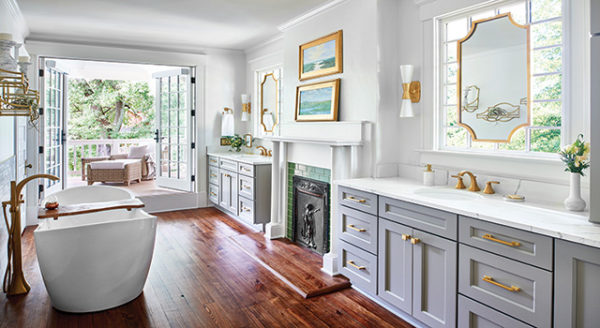
Award-Winning Kitchens, Baths, Interior Design and More
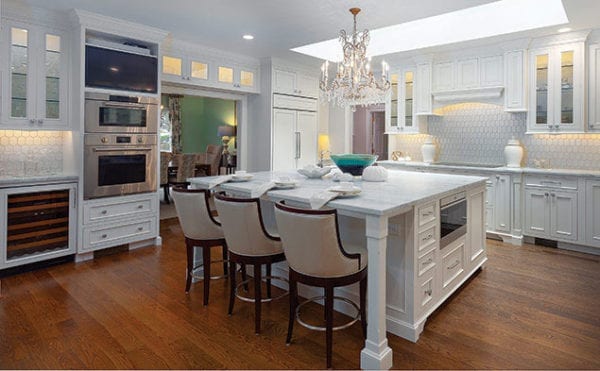
Atlanta’s NKBA Designs of Distinction 2019 Winners

100 Things to Know Before You Remodel

What’s the simplest way to upgrade your window treatments?
